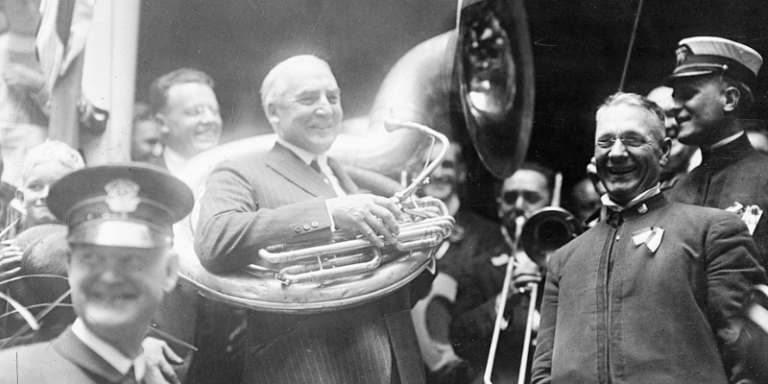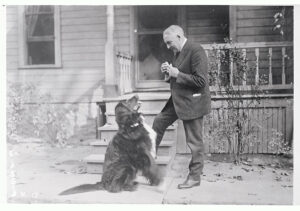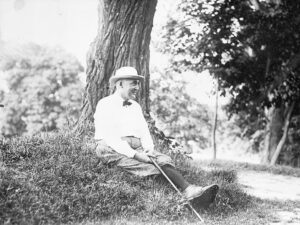Warren G. Harding: The Nation’s Greatest Landslide
Harding won the presidency with the greatest landslide the nation had seen.
By: Kelli Ballard | February 26, 2021 | 488 Words

After learning he has been selected as the Republican Party’s candidate for President, Warren G. Harding joins the band at his home in Marion, Ohio, playing the tuba. (Getty Images)
Warren G Harding was born November 2, 1865, on a farm in Ohio. He graduated from Ohio Central College in 1883 and worked as a reporter until 1884. He became the 29th president of the United States after winning what was at the time the greatest landslide in American history in 1920. He won 60% of the popular vote and won the Electoral College 404-127. He was a Republican who wanted less government in business and more business in government. But his term was full of scandal because of corrupt cabinet members. Still, he did manage some great accomplishments before his early death while still in office.

(Getty Images)
The Oval Office
Harding believed in the high protective tariffs, but was opposed to President Woodrow Wilson’s plan for the League of Nations. His front-porch campaign from his Ohio home was so well attended that the front lawn had to be replaced with gravel. He advocated for a “return to normalcy” after the end of World War I. His campaign platform, “Less government in business and more business in government,” was a popular promise that helped push his way towards becoming the next commander in chief. This was also a progressive era, and the first time women were able to exercise their right to vote during the 1920 presidential election after the 19th Amendment was ratified in August 1920.
On the surface, it doesn’t look like the new president accomplished much during his term; however, there were a few notable tasks. The Harding administration was able to reduce taxes, although mostly for the wealthy and corporations. The president and staff also limited immigration and signed the Budget and Accounting Act of 1921 which, among other things, established the General Accounting Office to audit the government.
 Unfortunately for Warren, he surrounded himself with less-than-worthy cabinet members who caused the biggest scandal of the 1920s known as the Teapot Dome Scandal. It was also the first time a cabinet member served time in jail for committing a felony while in office.
Unfortunately for Warren, he surrounded himself with less-than-worthy cabinet members who caused the biggest scandal of the 1920s known as the Teapot Dome Scandal. It was also the first time a cabinet member served time in jail for committing a felony while in office.
In the summer of 1923, during a cross-country tour of the nation, Harding was so depressed and unsure what to do about the situation, he talked to his Secretary of Commerce, Herbert Hoover. “If you knew of a great scandal in our administration,” he said, “would you for the good of the country and the party expose it publicly or would you bury it?” While Hoover suggested publishing the problem, Harding was afraid of political repercussions and did not say anything.

(Getty Images)
During that tour, the president is believed to have suffered a heart attack on August 2 and died at a San Francisco, CA hospital. Millions of people across the country gathered along the railroad tracks as Harding’s body was returned to Washington D.C. His home in Marion, OH later became a National Historic Landmark, which is open to the public.
















